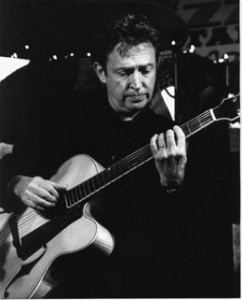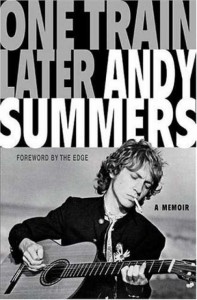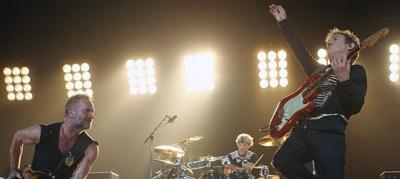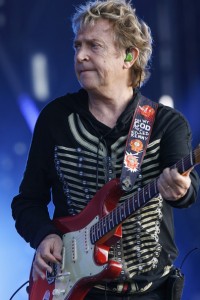 “Fuck you, Sting!” You hear that, or sentiments approximating it, in Can’t Stand Losing You: Surviving The Police, a new documentary drawn from guitarist Andy Summers’ acclaimed autobiography One Train Later. And Popdose heard it straight from Summers himself as he prepared for the film’s premiere, tonight at DOC NYC in Greenwich Village, not far from where the struggling band found some valedictory success at the famed CBGB in the late 70s.
“Fuck you, Sting!” You hear that, or sentiments approximating it, in Can’t Stand Losing You: Surviving The Police, a new documentary drawn from guitarist Andy Summers’ acclaimed autobiography One Train Later. And Popdose heard it straight from Summers himself as he prepared for the film’s premiere, tonight at DOC NYC in Greenwich Village, not far from where the struggling band found some valedictory success at the famed CBGB in the late 70s.
These days, however, Summers is likely to mean it in jest, though the movie does revisit some old battlefields. One year after Summers might have thought he had closed the book, literally, on The Police (One Train Later was published in 2006) the trio reunited after more than two decades for a record-smashing reunion tour. The candid, entertaining portrait–which focuses on the turbulent seven-year history of the band, in part by incorporating his own photography from the period, and additionally interspersed with footage of the 2007-2008 tour–continues the Summers saga by other means. He brought us further up to date on the eve of its opening.
What prompted you to make the film?
I was in London working on a photo book for Taschen, with all my photography of The Police. I saw Brett Morgen’s documentary The Kid Stays in the Picture, based on producer Robert Evans’ autobiography, and loved it–it was made out of still photographs and his voiceover. It occurred to me that I had parallel resources, both the photos and the book. A friend put me in touch with Brett, and I said to him, “I don’t know if you’d be interested, but I’ve got all this stuff…” [Laughs] And he was, which touched off this years-long saga, with a lot of grief and grit along the way. Which is the story of most films–they never happen easily. [The film, which is executive-produced by Summers and William J. Immerman, is produced by Morgan, Nicolas Cage, Norman Golightly, and Bob Yari, and directed and edited by Andy Grieve. Lauren Lazin directed the concert reunion footage.]
It’s your life–how was it decided what aspects would be part of the movie?
Well that’s the making of the film. We had a director who was making a film of almost every page of the book, and 2/3 of the way through production we switched completely; it was getting too heavy and sinking under its own weight. You can’t put it all in. Long story short we brought in Andy Grieve, who had a different point of view; he’s a brilliant editor who knew how to make it flow from one segment to another. He didn’t think of my life as one cherished moment after another, as I do [laughs], and threw out what wasn’t working for the film. It’s my point of view and my voiceover and my photographs, but it’s not the book.
 Did you think about broadening the perspective, perhaps by bringing in Sting and Stewart Copeland to comment?
Did you think about broadening the perspective, perhaps by bringing in Sting and Stewart Copeland to comment?
No, I didn’t want to do that. They’re in it already, and I’m not sure they would have done it anyway. Documentaries with too many talking heads get boring. This is the story of a guy who passed through the rock scene, with incredible footage of the recent tour. It’s a more visceral, and far more personal, experience, not some people yapping away about The Police’s place in rock history and all that.
The film offers a strong sense of the creative tensions that animated the band. At one point, as the reunion tour begins, Sting berates you for a faulty chord change…
Fuck you, Sting! [Laughs] To me that’s one of the cringe moments of the film; “Don’t put that shit in,” I said. But there’s a million moments of me doing the same to him as well. There was definitely a toxic deja vu feeling when we started out again on the tour–“fuck this, how do we get beyond this, it’s like going back to school.” But much of that was eradicated when we were in front of 20,000 people and were a band again. I felt we had to prove that we were still the best rock band in the world and that we had to kill it every single night.
I never saw myself as coming between Sting and Stewart when we were together; it was more like three pebbles sloshing around the bottom of a bucket, and going from side to side. That’s the dynamic of a trio.
[youtube id=”iPzNV8wZZoM” width=”600″ height=”350″]There’s one great scene in the movie, where you’re walking outside a karaoke bar in Tokyo…
It’s such a gonzo moment that I thought the movie might open with it. The crew was filming me on a snowy night in the Golden Gai area of Shinjuku, which is a series of alleys lined with bars, very Japanese. I was just taking pictures when, unbelievably, I heard “Every Breath You Take” coming out of one of these bars. I got the cameraman, who followed me in, and I just joined in, surrounded by drunks. When I revealed myself they all just sort of gasped and sighed. We got lucky there. [Laughs]
You must have a lot of moments like that in your life.
It’s one of those things where I’ll see a pair of jeans that I like in a store window, and when I go in they’re playing The Police. And restaurants, all the time; we’re so much a part of the fabric. I just got back from a month in Brazil, and it happened at least six times.
 The movie is in some way a reminder to your kids, that, yes, dad is part of rock royalty.
The movie is in some way a reminder to your kids, that, yes, dad is part of rock royalty.
Post-Police I brought my kids up. [Summers has three children, a daughter born just as the band was ascending, and twin boys born following its breakup.] It was kind of pathetic; to impress them, I’d say I was part of a rock band, and they’d say, “Yeah, yeah, sure dad.” [Laughs] Fortunately for me the reunion tour happened, not just in a few clubs but in massive stadiums. Before our first show my wife Kate said to them, “Kids, you’re about to see Dad as you’ve never seen him before.” [Laughs.] It was gratifying for me that they got to see it, to know that The Police really were a thing.
Their response?
Their response was typically American, as they are American kids: “You guys are cool.” [Laughs] That’s as much as I got.
When the band split up, you and Kate reconciled and remarried. What does she think about the film?
[Long pause] I’m scared to show it to her. [Laughs] She’s seen earlier versions and has been completely supportive, though a couple of times she said, “Did you have to put that bit in?” You were about ten years older than Sting or Stewart Copeland when The Police formed, and hardly an overnight sensation. How would the story of your life had gone had you found success at a younger age?
You were about ten years older than Sting or Stewart Copeland when The Police formed, and hardly an overnight sensation. How would the story of your life had gone had you found success at a younger age?
It would have been much harder to handle. I was 34, and had been through hard times as a musician, which allowed me to keep my feet more on the ground. Well, that’s not entirely true; you see in the film me living this completely pampered lifestyle in Bali and other places, with Kate and my daughter stuck at home. And when I came out of it, having been in it for so long–that was hard to deal with, too. My life had been totally distorted. The only way I could deal with it was to begin making records again. I couldn’t compete with The Police, but I could get back to playing music.
You’ve had a wide-ranging career. What interests you now?
For the past year I’ve been working on a rock album with a really great singer, drummer, and rock bass player I met here in LA named Rob Giles. We’ve got a new band, called Circa Zero. We’re going to release the first track from our first album right after Christmas. It’s all about the songs, which are very strong. Our sound is guitar-driven and melodic, and edgy, but neither heavy metal nor soft rock. I’d say it’s in the vein of The Police or U2.
You did an album devoted to Thelonious Monk, and another devoted to Charles Mingus. Is there another composer you might explore in similar depth?
I was going to do one about Miles Davis–the three “M’s.” And maybe I still will. I’ve spent so much time in Brazil, writing songs for the singer Fernanda Takai, that an obvious one would be Jobim, but so many people have done him already.
[youtube id=”jexLTrE1fpw” width=”600″ height=”350″]You’re fast approaching a significant milestone in your life–you’re turning 70.
You can keep that to yourself. [Laughs] What pisses me off is that I can never really avoid my birthday, as CNN always runs it on that little “Birthdays” crawl it has. But I’m not ready to hang up the boxing gloves just yet; there’s plenty going on, and I don’t think about the numbers at all. I’m sure Mick and Keith are going to go back out and play with as much vigor as they can, though they won’t have as much as me. [Laughs] Doing all this stuff keeps you young; I just toured Brazil with an eight-piece band and played guitar solos all night long. No change. So I’m going to fuck off to Tulum with my family and enjoy a private moment.





Comments